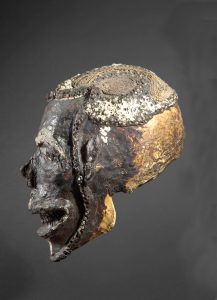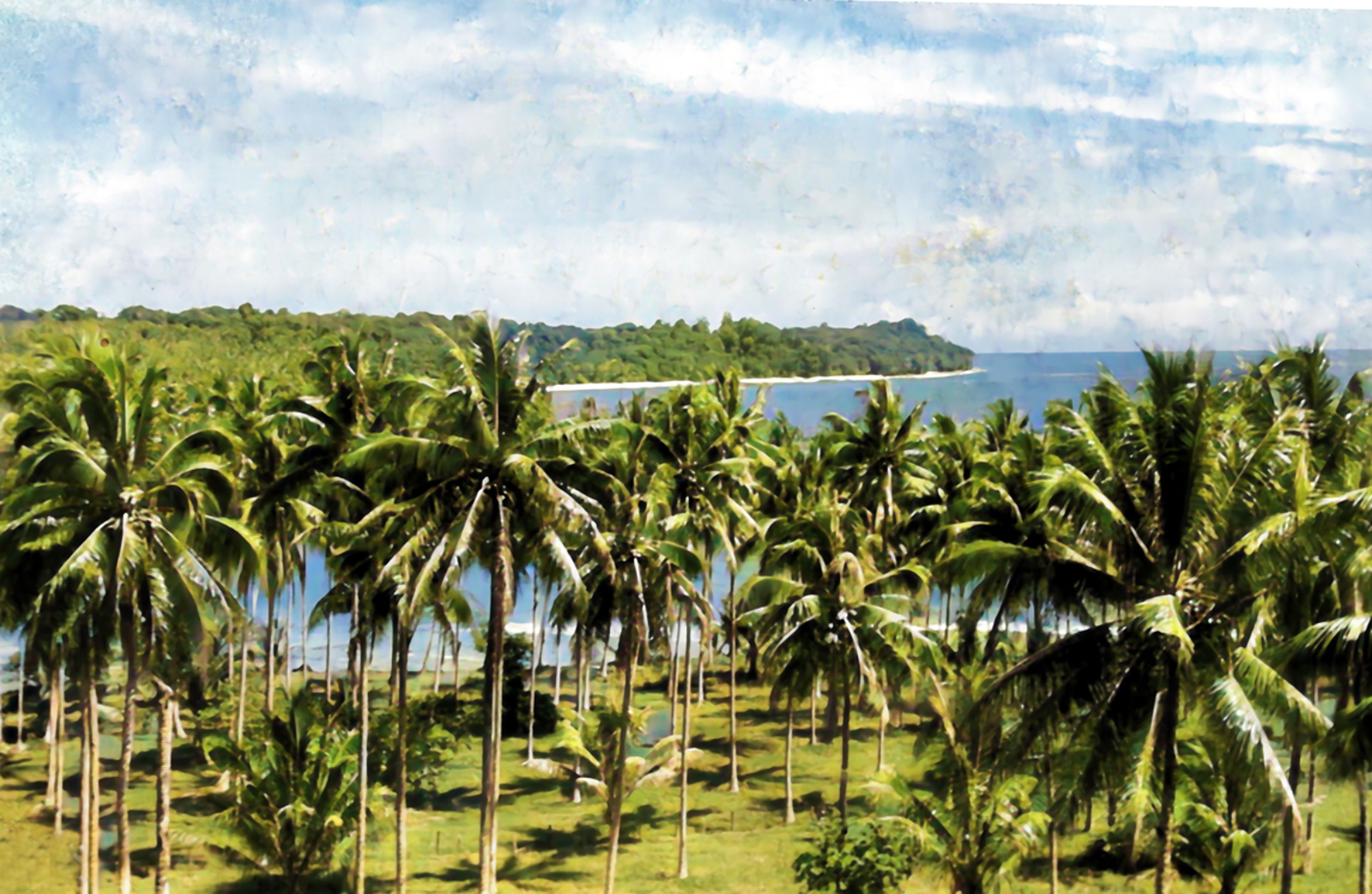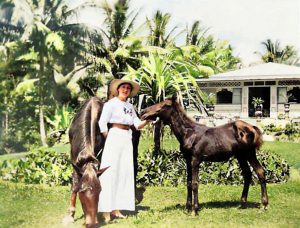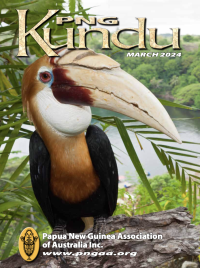The Skull – Peter Uechtritz
Our plantation, ‘Sum Sum’, is situated on a lonely stretch of the south-east coast of New Britain. Our nearest neighbours live twenty miles in one direction and thirty miles in the other. Native tracks come from their inland villages to the coast, and these with the coastal tracks are our only local means of communication. The only means of reaching ‘Sum Sum’ from Rabaul is by sea. Each month an island schooner appears and brings us any visitors and the necessary provisions; picks up the plantation products and the copra and anyone going to Rabaul, etc. From time to time some other ships arrive to wait in the bay for better weather, or to drop anchor for only a night or so, but that happens very seldom.
On one nice sunny morning in 1931 my wife Joanna (Dolly, née Parkinson) was working in our garden, while I went, as usual, to our plantation to direct the plantation labourers with their work. Some little time later, our native house servant came running in my direction, out of breath. I had already seen him when he was some distance away. At once, I became worried; had something really bad happened to our children?
‘What’s the reason?’ I asked him when he arrived.
‘Your wife told me, that you should come home very quickly, because a ship has arrived.’
I felt much relieved that nothing serious had happened. In such a place as this, one always feels and has a great responsibility for children and that burdens me all the time, ‘What about the ship?’ I asked my native servant.
‘I don’t know, I never have seen it before’. As this native servant had been living for six years on our plantation and all the usual ships are known to him, it must indeed be a new one.
‘Have you seen the master?’
‘Yes, he is already at the house, but I don’t know him.’ I gave my native servant necessary instructions and returned home. When I arrived, I was very surprised to see a senior doctor sitting in my chair for the first time. I immediately thought that his reason for coming was to check and inspect my native labourers and the native hospital. But that seemed to me to be rather unusual as such inspections are usually done by other persons of lower rank. I therefore assumed that he visited us for another reason.
Tea was served and now the doctor, who was very well known to us as an extraordinarily kind person, explained that he was visiting the south coast to collect skulls from different tribes. He was very pleased that he had been very successful and was now on the way back to Rabaul. As well, he told me that he had stopped at ‘Sum Sum’ to ask if I could organise a skull from our district, because he did not have one in his collection from this tribal area.
The ‘Baining’, which is the name of the tribe, are very shy natives, normally living a primitive existence in the mountains and quite remote from civilisation. It is not easy to contact them. The doctor told me that, if it would be possible for me to get the Bainings to sell him a skull, he would pay any price they wanted. ‘It would be a great pleasure for me to assist you,’ I replied.
Very pleased with this answer the doctor stood up and told me that he was now continuing his voyage to Rabaul, and that I should send him the skull as soon as possible. I suggested to him that if he could remain until the next morning, I believe I would be able to arrange this and he could take a skull with him. This was quite acceptable to him and he agreed to stay a night and be our guest.
I called for a Baining from amongst some of my plantation labourers. His name was Amatum. I chose him because he appeared to me to be brighter than his fellow tribesmen. Amatum quickly appeared. ‘Amatum,’ I said, ‘this master is a famous medical doctor and he wishes to collect a skull from your native tribe. With such a skull he will be able to discover the reason why you Bainings people die so often.’
I gave Amatum a short while to think about this task and asked him if he could organise one. He did not reply immediately and I waited for his answer. ‘Yes, I can do that,’ he finally answered.
‘That’s very good, but this master can’t stay long, he has to return early the next morning. If you can organise the skull by then, you will receive several rolls of tobacco.’ This is a much-desired possession for the natives. He appeared to be very satisfied with the prospect of receiving the tobacco and left us smiling.
 With the doctor I then had a detailed discussion about the different corpse disposal methods of the natives of this area. The ‘Sulkas’ bury their dead in the ground under their huts. The ‘Mengen’ tribe wrap up parts of the corpse and hang them under the roof of their huts. Others have a special place in the middle of their village to bury them. In the northern part of New Ireland the corpse will be painted before burning. Later their relatives wear little baskets with some fragments of the bones with them, believing this will protect them by magic.
With the doctor I then had a detailed discussion about the different corpse disposal methods of the natives of this area. The ‘Sulkas’ bury their dead in the ground under their huts. The ‘Mengen’ tribe wrap up parts of the corpse and hang them under the roof of their huts. Others have a special place in the middle of their village to bury them. In the northern part of New Ireland the corpse will be painted before burning. Later their relatives wear little baskets with some fragments of the bones with them, believing this will protect them by magic.
None of these rituals is practised by the Bainings. They carry a dead person into the jungle, as we call the primeval forest here, and they finally lay the corpse down, in a sitting position, at the foot of a great tree. This corpse will then be surrounded by a small stone wall and the ceremony is over. There is no special place for a corpse to be placed. Finally, wild pigs and other animals do the rest. The doctor listened to my tales and was astonished as he had previously never heard of these corpse disposal methods.
I had thought that Amatum knew where a corpse might be located, as he had agreed relatively quickly to return with a skull. Next morning after breakfast we were sitting together on the verandah waiting hopefully for Amatum to return. Will he be able to uphold his word? I was sure that he will do so. As we waited, a short time later we saw Amatum in the distance holding something under his arm.
The doctor jumped up excitedly when Amatum arrived. He had brought a nice large skull and handed it over to him. I immediately gave Amatum the tobacco I had promised him, asking him, ‘Do you know whose skull that is?’
He rose and with his finger pointing to the skull said with a wide grin, ‘That is my father!’ With this he left our place satisfied with his tobacco.
The author, Peter Karl Gustav Uechtritz (1889–1947), was the son of Carl August Wilhelm and Anna Catharina Uechtritz, and the husband of Joanna (Dolly) Parkinson, daughter of Phebe Clothilde Parkinson.
Phebe was the daughter of the American Consul at Apia, Samoa and granddaughter of a Samoan chief—and the German scientist, Richard Parkinson, who she married at age sixteen.
Peter and Dolly’s son was Alfred Uechtritz, and PNGAA’s Max Uechtritz is the great-grandson of Phebe and Richard Parkinson.
This article was translated by K Baumann and Max Hayes and originally published in Una Voce, September 2005.






